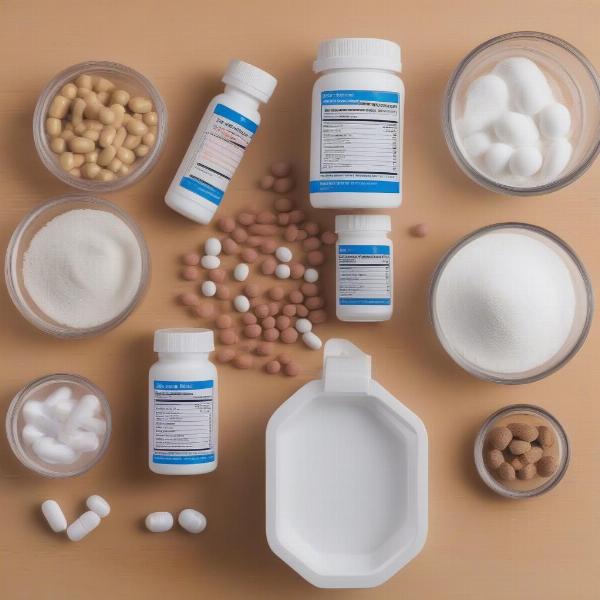L-lysine is an essential amino acid that plays a crucial role in a dog’s overall health and well-being. While dogs can’t produce lysine on their own, it’s vital for various bodily functions, including growth, tissue repair, and immune system support. This guide explores the benefits of l-lysine for dogs, its uses, dosage recommendations, and potential side effects.
Understanding the Importance of L-Lysine in Dogs
Lysine is essential for protein synthesis, which is crucial for building and repairing tissues, including muscles, skin, and cartilage. It’s also involved in the production of hormones, enzymes, and antibodies. A deficiency in lysine can lead to various health problems, including impaired growth, weakened immune function, and increased susceptibility to infections.
Benefits of L-Lysine for Dogs
L-lysine supplements can be beneficial for dogs in various situations. They’re often used to support immune function, particularly in dogs prone to viral infections like feline herpesvirus (FHV-1), which can cause upper respiratory infections and eye issues in dogs. L-lysine may also help manage stress, promote wound healing, and improve bone health. It has also shown promise in helping dogs with certain eye conditions and reducing anxiety.
L-Lysine for Canine Herpesvirus
One of the most common uses of l-lysine in dogs is to manage feline herpesvirus. While “feline” is in the name, this virus can indeed affect dogs. L-lysine can help suppress the replication of the herpesvirus, reducing the severity and frequency of outbreaks.
Dosage and Administration of L-Lysine for Dogs
The appropriate dosage of l-lysine for dogs varies depending on the dog’s weight, the specific condition being addressed, and the form of the supplement. It’s crucial to consult with a veterinarian to determine the optimal dosage for your dog. L-lysine is available in various forms, including tablets, capsules, powders, and treats.
 L-Lysine Dog Dosage Forms
L-Lysine Dog Dosage Forms
Potential Side Effects of L-Lysine in Dogs
While generally considered safe, l-lysine can cause some side effects in dogs, including gastrointestinal upset, such as vomiting and diarrhea. In rare cases, allergic reactions can occur. It’s essential to start with a low dose and gradually increase it to monitor for any adverse reactions.
Choosing the Right L-Lysine Supplement for Your Dog
When choosing an l-lysine supplement for your dog, look for high-quality products from reputable brands. Consider the form of the supplement and choose one that’s easy to administer to your dog. Check the label for dosage instructions and any potential allergens.
What if My Dog is Already on Other Medications?
If your dog is currently taking other medications, consult your vet before giving them l-lysine. While generally safe, there can be interactions with certain medications.
Can L-Lysine Help My Senior Dog?
L-Lysine may benefit senior dogs by supporting joint health and mobility. However, always consult your vet before adding any supplements to your senior dog’s diet.
Conclusion
L-lysine can be a valuable supplement for supporting a dog’s health, particularly in managing certain viral infections and promoting tissue repair. However, it’s essential to consult with a veterinarian before administering l-lysine to your dog, especially if they’re on other medications or have underlying health conditions. By working with your vet, you can ensure that your dog receives the appropriate dosage and form of l-lysine to maximize its benefits.
FAQ
- What is l-lysine used for in dogs? L-lysine is primarily used to support immune function, manage viral infections (like FHV-1), and promote tissue repair.
- What are the signs of lysine deficiency in dogs? Signs include poor growth, weakened immune function, and increased susceptibility to infections.
- How much l-lysine should I give my dog? Consult with your veterinarian for the appropriate dosage based on your dog’s weight and specific needs.
- Are there any side effects of l-lysine in dogs? Potential side effects include gastrointestinal upset, such as vomiting and diarrhea. Allergic reactions are rare.
- Can I give my dog human l-lysine supplements? It’s best to use l-lysine supplements specifically formulated for dogs to ensure proper dosage and safety.
- Can l-lysine be used long-term in dogs? Discuss long-term use with your veterinarian to ensure it’s appropriate for your dog’s individual needs.
- Where can I buy l-lysine supplements for my dog? L-lysine supplements for dogs are available at pet stores, veterinary clinics, and online retailers.
ILM Dog is a leading international pet website dedicated to providing expert advice and resources on dog care and well-being. We cover various topics, including breed selection, health care, training, nutrition, grooming, and product recommendations. If you have any questions about L-Lysine or any other dog care topic, don’t hesitate to contact us. Email: [email protected], Phone: +44 20-3965-8624. Visit ILM Dog for more valuable insights and expert guidance on dog care.